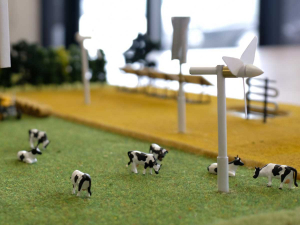New Zealand’s first Energy Demonstration Farm is at work, with an aim to find sustainable energy solutions to meet the Government’s carbon reduction requirements.
The Energy Demonstration Farm is designed to be fossil fuel-free and feature solar and wind power, bio-fuel, and energy storage solutions while showcasing the range of technology available and how it can be applied, as well as providing data for research and innovation.
The project is a partnership between Lincoln University and the Ministry for Primary Industries (MPI).
Leading the project are Dr Wim de Koning and Dr Jeff Heyl of Lincoln University. They said the Energy Demonstration Farm would be unique in its set-up and a world-first in its scale and scope.
“Transitioning to sustainable energy in the agri-food sector is a necessity,” de Koning said.
“The Government’s zero carbon legislation has provided a time-frame of 30 years for completion of this transition.
“To meet the Government goal of 100% renewable energy by 2035, we need to start making the first major steps with urgency.
De Koning said the farm would show the diverse range of sustainable energy production technology currently available, from fossil fuel to circular food production systems.
“It’s leading transformation through demonstration - to facilitate sustainable, feasible and bankable solutions.”
“The small and medium-sized enterprises operating in the primary industries need a pre-investment proof of concept.”
“They don’t have the capacity to make mistakes by investing in the wrong technology. At the Energy Demonstration Farm we can explore alternatives, not all of which may be successful. We can provide that proof so the right choices are made.”
MPI Acting Director Investment Portfolio, Cheyne Gillooly, said the Energy Demonstration Farm has the potential for farmers to explore the technology and test it before they make an investment.
“Farming is a high tech, high capital business and New Zealand farmers have always been at the forefront of innovative farming techniques. We’re excited to support the Energy Demonstration Farm and help give farmers an opportunity to test the technology beforehand.”
The six-hectare farm site is near the Lincoln University Dairy Farm and the main campus.











